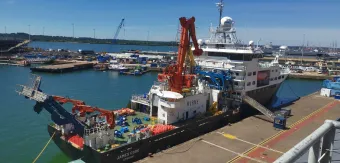
Scientists from the National Oceanography Centre (NOC) and the Scottish Association for Marine Science (SAMS) will be embarking on an expedition to the North Atlantic Subpolar Gyre to measure ocean changes and how they affect the UK’s weather systems.
The new knowledge gained will have direct impacts on strategies for the mitigation and adaptation to climate change within the UK.
The research expedition will take place onboard the RRS James Cook and aims to better understand ocean circulation through continuous observations of the North Atlantic Subpolar Gyre. The data will answer questions relating to the global carbon cycle – the process by which carbon is exchanged between its four main reservoirs; the atmosphere, the biosphere (vegetation, soil etc), oceans and sediments such as the Earth’s crust. It will also look at the impact these changes will have on the marine ecosystem, such as changes to fish stocks as well as the health of protected marine areas west of the UK.
The team will make observations of ocean variables such as temperature, salinity, carbon and oxygen, as well as deploying a new recorder to measure water pressure at the seafloor. The pressure recorder will remain in the water for ten years and the data it gathers will be harvested remotely without a need to recover the device. The pressure at the bottom of the sea is three hundred times greater than air pressure on land, and how it changes over time tells scientists about the ocean currents. If successful, the new pressure recorder will pave the way for net zero carbon methods to measure the huge ocean currents that flow through the North Atlantic.
Professor Penny Holliday, Head of Marine Physics and Ocean Climate, at the National Oceanography Centre, said: “This ground-breaking research will provide vital evidence to policymakers deciding on the UK Government’s future strategy for combatting climate change. NOC is playing a leading role in gaining an understanding into previously unknown areas of ocean research and its impact on populations worldwide, and this expedition will take this research towards net zero oceanographic capability using new technologies.”
Dr Ben Moat, Chief Scientist for the expedition and Physical Oceanographer at the National Oceanography Centre, added: “It’s really exciting to see this brand-new technology being deployed to assist with our research. The UK-OSNAP (UK Overturning in the Subpolar North Atlantic) expedition will help us better understand ocean circulations and fluxes by constant observations of the North Atlantic Subpolar Gyre. Using new technology such as the latest UK Argo floats and a new drift-free pressure recorder will allow easier data collection and will help to better inform climate change solutions.”
International students Adeola Dahunsi and Selasi Yao Avornyo also joined the expedition as part of our West P&I Seagoing Science Bursary. Meet the students and learn about their experiences.
Join our Ocean News Community to get weekly expedition updates